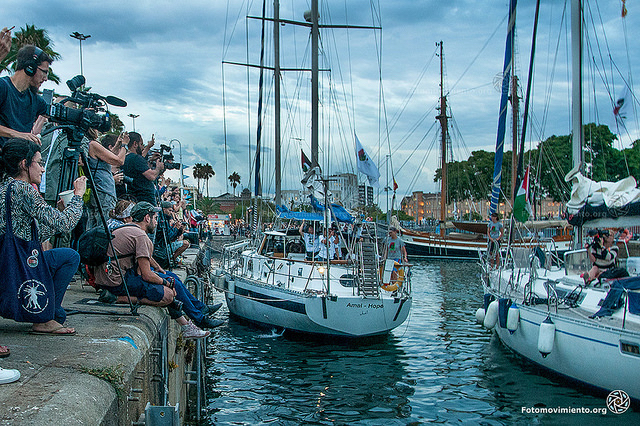Wendy Goldsmith is an activist and social worker from London, Ont. She is on one of the Women’s Boats to Gaza. Goldsmith’s boat didn’t make it out of Sicily, but they remained in contact with the Zaytouna-Oliva up until they were boarded and kidnapped in international waters by the Israeli Occupation Forces.
rabble.ca’s Meg Borthwick spoke to Goldsmith about her journey with the Women’s Boat to Gaza.
How did you become involved with the Women’s Boat to Gaza?
To answer your question, I first have to talk about how I got involved in flotilla work in the first place. I grew up in middle-class suburbia, not really understanding much about Middle East politics. “They were far away, had been fighting for years, and probably always would be.” It was “none of our business.” It was a combination of a good dose of education, social media and Operation Cast Lead that changed the way I saw the occupation of Palestine by Israel. I could no longer see it as a conflict because that implies fairness and proportionality, neither of which applies in this situation. Gaza is simply the world’s largest open-air prison, deemed by the United Nations to be uninhabitable in four short years — by 2020.
When the three weeks of relentless attacks on Gaza that became known as Operation Cast Lead produced photos of the mass destruction and murder of women and children, the use of white phosphorous and images of bombs raining down on schools and hospitals emerged on Facebook, I knew that I could no longer be complicit in these heinous war crimes committed by Israel.
I called a meeting in my living room and together with many good souls across the country Canada sent a strong delegation to the Gaza Freedom March in 2008-9. We didn’t get into Gaza, but we created incredible connections with 1,300 activists around the world, many of whom I continue to work with and who inspire and inform my actions. From there, and with the establishment of a solid Canadian solidarity network, we joined the Freedom Flotilla Coalition, in direct response to the murders by Israeli commandos on board the Turkish ship, the Mavi Marmara. Following that tragedy, we all knew that Canadian civil society needed to take a principled stand, in spite of our government.
Canada has been a strong partner in many missions ever since and its history can be found online. As you can imagine, organizing with men and women from around the world, speaking many different languages, comes with challenges. Against all odds, time and time again, we sent boats to break the illegal blockade, and once, with Gaza’s Ark, even tried to break the blockade from within.
During Freedom Flotilla II, I came to know some American women well. Jane Hirschmann and Laurie Arbeiter are solid activists and they are also solid feminists. So when the international meeting, heavily ladened with male voices, began to take on an all too familiar patriarchal tone, the three of us decided to take a break and to have lunch together on a beautiful patio in Rome. We discussed many things and eventually the conversation came around to the idea of a women’s-only boat.
Our whimsical idea suddenly started to make sense. To simultaneously raise women’s voices in solidarity with women in Gaza while disrupting the Israeli Occupation Forces’ idea of what it means to be an activist seemed like a brilliant way to begin to shift the paradigm.
We imagined inviting the young soldiers on board for dinner as they tried to violently board our ship. We knew it was a long shot but after lunch we took a risk and pitched it to our international coalition anyway. We planted a seed that day, a seed that grew deep roots, crossed countries and oceans, and five years later, that seed became the Women’s Boat to Gaza project. As a woman, a daughter, a mother and a social worker, this project has touched my heart in many ways and continues to fuel my hope for humanity.
How did you raise the funds and procure the boats?
All of the money we have raised has come from individuals or civil society groups. In Canada we held fundraisers and dinners, sold T-shirts and asked friends and family to help out. This truly is a grassroots initiative. We organize in committees, and the logistics committee was tasked with buying the boats. We had people on the ground in Spain who inspected and bought the boats. Our organizing requires diverse skill sets.
This is an extraordinary thing you and many other women have accomplished. Will you make another journey to Gaza?
The Freedom Flotilla Coalition will continue to organize and sail until the illegal blockade of Gaza is lifted. It will take some time for us to regroup and decide what our next steps will be, but there will most certainly be next steps. In the meantime we will continue our important solidarity work across the globe and especially in Palestine. We will never lose hope that Gaza will be free.
The Zaytoun-Oliva made it to within 63 km of Gaza before the Israeli occupation forces illegally boarded them. What is their status now? What’s happening with the boat?
They are all being flown out to their home countries. The boat is still in Ashdod. We will start demanding its return — another drama to unfold.
Meg Borthwick has been working in alternative media, in broadcast, print and online, for nearly 30 years. She is a freelance writer and is the moderator for rabble’s discussion forum, babble.




